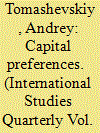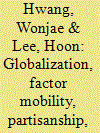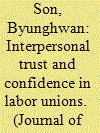| Srl | Item |
| 1 |
ID:
146159


|
|
|
|
|
| Summary/Abstract |
Many argue that government partisanship influences the size of investment flows into stocks and bonds. But existing literature tells us little about how international capital flows influence election outcomes. I argue that passive investment into stocks, bonds, and other debt instruments—in other words, portfolio investments—increases political contributions to right-wing parties. This investment generates resources for domestic capitalists. These owners of capital then channel these resources into political contributions to right-wing parties and enhance those parties' electoral position. Thus, passive investment bolsters the electoral chances of right-wing governments. I illustrate this process with a formal model of special interest politics in which lobbies operate under budget constraint. Using a new data set on political contributions and statistical analyses for a sample of states from 1980–2009, I find support for my general argument.
|
|
|
|
|
|
|
|
|
|
|
|
|
|
|
|
| 2 |
ID:
131001


|
|
|
|
|
| Publication |
2014.
|
| Summary/Abstract |
This paper examines the relationship between economic globalization, factor mobility, government partisanship, and the relative budgetary salience of two different instruments of compensation policies: social welfare spending and industrial subsidy provision. While welfare spending directly benefits labor, industrial subsidies benefit both capital owners and labor along the sectoral line. Based on both factoral and sectoral models of trade, we theoretically argue and empirically show that governments are more likely to use welfare politics as compensation policies if free trade generates class-based interests in the society, and subsidy politics if trade openness promotes industry-based interests. We also argue that the interactions of the three variables are contingent on government partisanship. When non-class-based interests are salient as a consequence of trade openness, left-wing governments are likely to focus on welfare politics while right-wing governments favor provision of subsidies. However, when class-based interests are salient, even right-wing governments behave similarly to left-wing governments, favoring welfare spending over subsidies as the key compensation policy. In the analysis of compensation policies in the OECD countries between 1980 and 2001, the test results confirm our expectation
|
|
|
|
|
|
|
|
|
|
|
|
|
|
|
|
| 3 |
ID:
174129


|
|
|
|
|
| Summary/Abstract |
How do ordinary citizens view labor unions? The importance of public opinion about unions has rarely been highlighted in the contemporary literature on labor politics. Using five waves of the World Value Surveys on South Korea, this article suggests that public confidence in labor unions is significantly affected by individuals’ interpersonal trust, conditional on their perception of the political representation of labor. Unlike those with high levels of trust, low-trust individuals view unions as an agent seeking their exclusionary interests at the expense of the rest of the society. The difference between high- and low-trust individuals’ confidence in labor unions is more pronounced when a liberal, rather than a conservative, government is in power because of the public perception that labor interests are already well-represented by the liberal government and union functions are redundant in such a circumstances. The empirical findings are found robust to alternative theoretical arguments and empirical techniques.
|
|
|
|
|
|
|
|
|
|
|
|
|
|
|
|